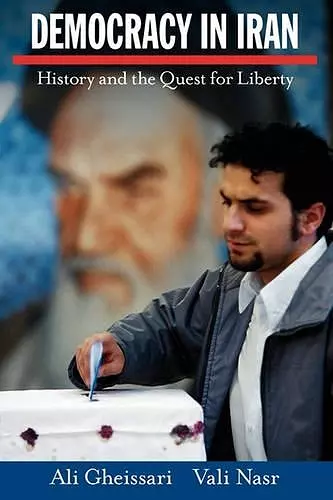Democracy in Iran
History and the Quest for Liberty
Ali Gheissari author Vali Nasr author
Format:Paperback
Publisher:Oxford University Press Inc
Published:24th Jul '09
Currently unavailable, and unfortunately no date known when it will be back
This paperback is available in another edition too:
- Hardback£96.00(9780195189674)

Today Iran is once again in the headlines. Reputed to be developing nuclear weapons, the future of Iraq's next-door neighbor is a matter of grave concern both for the stability of the region and for the safety of the global community. President George W. Bush labeled it part of the "Axis of Evil," and rails against the country's authoritarian leadership. Yet as Bush trumpets the spread of democracy throughout the Middle East, few note that Iran has one of the longest-running experiences with democracy in the region. In this book, Ali Gheissari and Vali Nasr look at the political history of Iran in the modern era, and offer an in-depth analysis of the prospects for democracy to flourish there. After having produced the only successful Islamist challenge to the state, a revolution, and an Islamic Republic, Iran is now poised to produce a genuine and indigenous democratic movement in the Muslim world. Democracy in Iran is neither a sudden development nor a western import, Gheissari and Nasr argue. The concept of democracy in Iran today may appear to be a reaction to authoritarianism, but it is an old idea with a complex history, one that is tightly interwoven with the main forces that have shaped Iranian society and politics, institutions, identities, and interests. Indeed, the demand for democracy first surfaced in Iran a century ago at the end of the Qajar period, and helped produce Iran's surprisingly liberal first constitution in 1906. Gheissari and Nasr seek to understand why democracy failed to grow roots and lost ground to an autocratic Iranian state. Why was democracy absent from the ideological debates of the 1960s and 1970s? Most important, why has it now become a powerful social, political, and intellectual force? How have modernization, social change, economic growth, and the experience of the revolution converged to make this possible?
A clear and readable account of politics in the Islamic Republic. * The Washington Post *
A comprehensive overview of Iran's history on its way towards democracy...shed[s] new light on already well-known facts, recombining them into an unfamiliar but conclusive shape; and on top of that is an impressive read. * Iranian Studies *
Democracy in Iran unravels the jumble of paradoxes that have marked Iranian politics over the last century. The country has experienced considerable success in state-building and development but has periodically undermined both by failing to consolidate democracy. Presently, it has many of the elements of a lively democracy but, somehow, is not a democracy at all. Iranians have successfully challenged candidates supported by the Supreme Leader of the Islamic Republic but have failed to weaken clerical control of the state. Vali Nasr and Ali Gheissari do an outstanding job of explaining how Iran keeps flirting with democratic governance, more than practically any other Islamic country in the Middle East, yet somehow always seems to fall short of sealing the marriage. * Joel Migdal, Professor of International Studies, University of Washington, and author of State in Society *
A comprehensive account of political developments in Iran in the last century, theoretically sophisticated and yet very accessible. Easily the best book in a decade on Iran's bumpy road to democracy through two revolutions and much anti-democratic state-building. * Said Amir Arjomand, author of The Turban for the Crown *
Democracy in Iran is a bold and sweeping survey of the past century of Iranian political history, an absorbing drama of contending ideologies, social classes, revolutionary movements, international pressures, political factions, and charismatic leaders. Nasr and Gheissari vividly expose Iran's ongoing struggle between democratic principles of freedom and accountability, the authoritarian-modernist quest for order and development, and revolutionary idealism, both secular and religious. In the process, they show once again the folly of all forms of utopianism and the necessity of constitutional and representative government. This is not just a book about Iran, but an insightful study of how regimes rise, evolve, stagnate, fragment, and fall. * Larry Diamond, author of Squandered Victory *
Iran is often portrayed in the West as 'despotic,' 'autocratic,' and 'totalitarian.' This lucid and succinct book is an excellent antidote to the conventional view. It narrates eloquently the history of modern Iran through the prism of democracy * its birth, growth, trials and tribulations, and, despite recent setbacks, its continued vibrancy and extensive social roots. Those interested in modern Iran would do well to read this highly informative book.Ervand Abrahamian, author of Tortured Confessions *
ISBN: 9780195396966
Dimensions: 150mm x 229mm x 18mm
Weight: 318g
232 pages